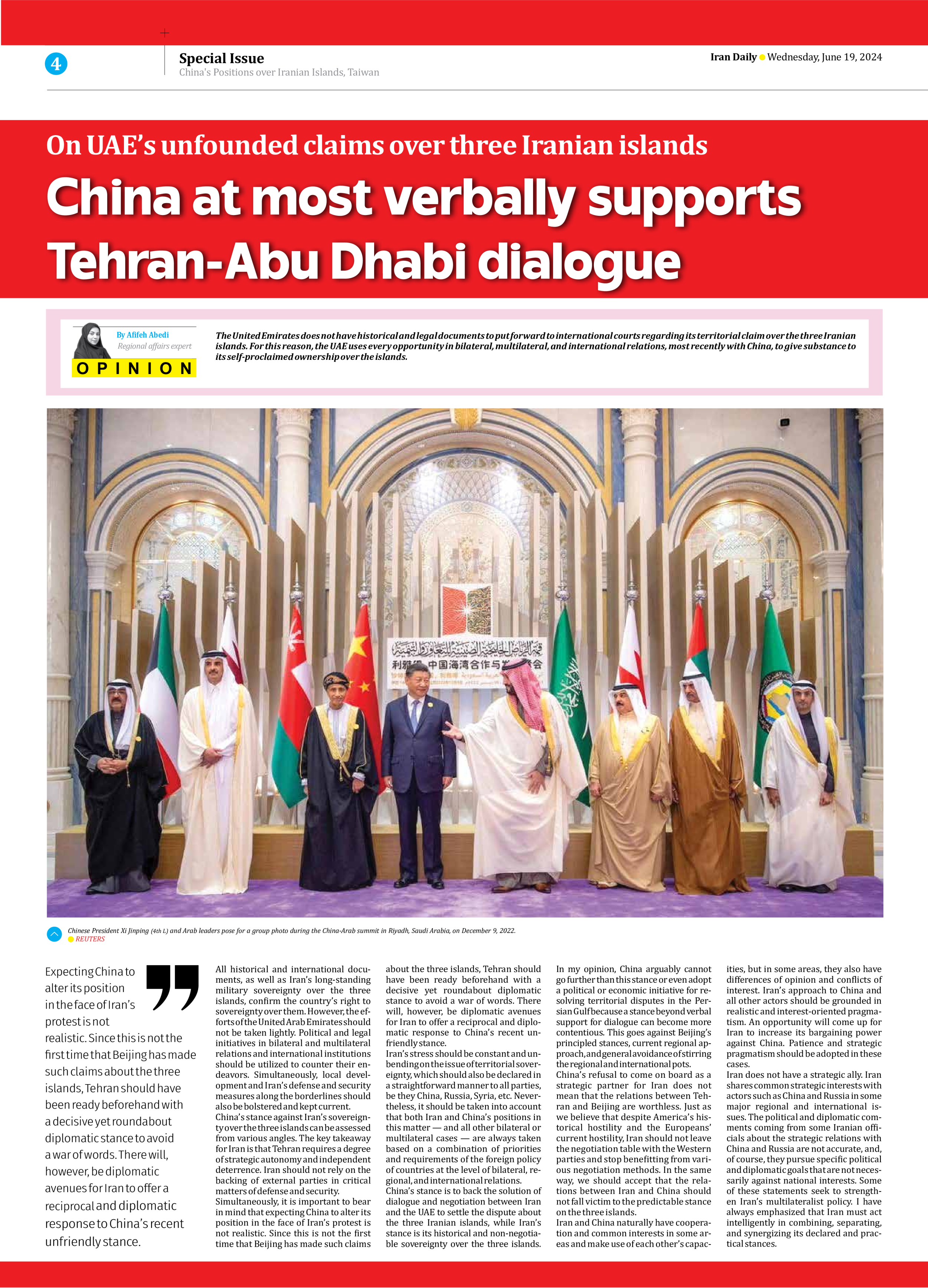
On UAE’s unfounded claims over three Iranian islands
China at most verbally supports Tehran-Abu Dhabi dialogue
The United Emirates does not have historical and legal documents to put forward to international courts regarding its territorial claim over the three Iranian islands. For this reason, the UAE uses every opportunity in bilateral, multilateral, and international relations, most recently with China, to give substance to its self-proclaimed ownership over the islands.
By Afifeh Abedi
Regional affairs expert
All historical and international documents, as well as Iran’s long-standing military sovereignty over the three islands, confirm the country’s right to sovereignty over them. However, the efforts of the United Arab Emirates should not be taken lightly. Political and legal initiatives in bilateral and multilateral relations and international institutions should be utilized to counter their endeavors. Simultaneously, local development and Iran’s defense and security measures along the borderlines should also be bolstered and kept current.
China’s stance against Iran’s sovereignty over the three islands can be assessed from various angles. The key takeaway for Iran is that Tehran requires a degree of strategic autonomy and independent deterrence. Iran should not rely on the backing of external parties in critical matters of defense and security.
Simultaneously, it is important to bear in mind that expecting China to alter its position in the face of Iran’s protest is not realistic. Since this is not the first time that Beijing has made such claims about the three islands, Tehran should have been ready beforehand with a decisive yet roundabout diplomatic stance to avoid a war of words. There will, however, be diplomatic avenues for Iran to offer a reciprocal and diplomatic response to China’s recent unfriendly stance.
Iran’s stress should be constant and unbending on the issue of territorial sovereignty, which should also be declared in a straightforward manner to all parties, be they China, Russia, Syria, etc. Nevertheless, it should be taken into account that both Iran and China’s positions in this matter — and all other bilateral or multilateral cases — are always taken based on a combination of priorities and requirements of the foreign policy of countries at the level of bilateral, regional, and international relations.
China’s stance is to back the solution of dialogue and negotiation between Iran and the UAE to settle the dispute about the three Iranian islands, while Iran’s stance is its historical and non-negotiable sovereignty over the three islands. In my opinion, China arguably cannot go further than this stance or even adopt a political or economic initiative for resolving territorial disputes in the Persian Gulf because a stance beyond verbal support for dialogue can become more contentious. This goes against Beijing’s principled stances, current regional approach, and general avoidance of stirring the regional and international pots.
China’s refusal to come on board as a strategic partner for Iran does not mean that the relations between Tehran and Beijing are worthless. Just as we believe that despite America’s historical hostility and the Europeans’ current hostility, Iran should not leave the negotiation table with the Western parties and stop benefitting from various negotiation methods. In the same way, we should accept that the relations between Iran and China should not fall victim to the predictable stance on the three islands.
Iran and China naturally have cooperation and common interests in some areas and make use of each other’s capacities, but in some areas, they also have differences of opinion and conflicts of interest. Iran’s approach to China and all other actors should be grounded in realistic and interest-oriented pragmatism. An opportunity will come up for Iran to increase its bargaining power against China. Patience and strategic pragmatism should be adopted in these cases.
Iran does not have a strategic ally. Iran shares common strategic interests with actors such as China and Russia in some major regional and international issues. The political and diplomatic comments coming from some Iranian officials about the strategic relations with China and Russia are not accurate, and, of course, they pursue specific political and diplomatic goals that are not necessarily against national interests. Some of these statements seek to strengthen Iran’s multilateralist policy. I have always emphasized that Iran must act intelligently in combining, separating, and synergizing its declared and practical stances.







